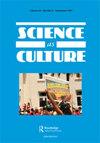The Role of US Policymaking in the Emergence of a Digital Health Assemblage
IF 2.4
3区 哲学
Q1 CULTURAL STUDIES
引用次数: 1
Abstract
ABSTRACT Promising to improve the quality of care while decreasing healthcare costs, digital health technologies (DHT) are welcomed as a solution to the challenges increasingly faced by healthcare systems in the global north. In recent years, tech developers, consultants, policymakers, and researchers in the US have heralded Big Tech entrepreneurs as driving the emergence of these technologies. However, apart from Silicon Valley visions of DHT, there are a range of regulations, devices, institutions, and practices constituting the DHT assemblage in the US. These include US policies following the global financial crisis of 2008 – such as the US' monetary policy, and the Health Information Technology for Economic and Clinical Health Act (HITECH Act) – and the enactment of the Patient Protection and Affordable Care Act (ACA). Accordingly, a more granular approach is required to understand the rise of DHT beyond these stereotypical ‘Silicon Valley’ accounts of the emergence of disruptive digital technologies. Careful attention on various, seemingly unrelated, policymaking events reveals how the unintended alignment of these US policy visions, regulations, devices, institutions, and practices have played an instrumental role in the successful emergence of DHT, while also impacting ongoing global developments of these technologies.美国政策制定在数字健康组合出现中的作用
数字健康技术(DHT)有望在降低医疗成本的同时提高医疗质量,作为解决全球北方医疗保健系统日益面临的挑战的一种解决方案受到欢迎。近年来,美国的技术开发人员、顾问、政策制定者和研究人员都宣称,大型科技企业家正在推动这些技术的出现。然而,除了硅谷对DHT的愿景之外,美国还有一系列构成DHT组合的法规、设备、机构和实践。其中包括美国在2008年全球金融危机之后的政策——例如美国的货币政策和《卫生信息技术促进经济和临床健康法》(HITECH法案)——以及《患者保护和平价医疗法案》(ACA)的颁布。因此,我们需要一种更细致的方法来理解DHT的崛起,而不是这些关于颠覆性数字技术出现的刻板的“硅谷”描述。对各种看似无关的政策制定事件的仔细关注揭示了这些美国政策愿景、法规、设备、制度和实践的意外一致如何在DHT的成功出现中发挥了重要作用,同时也影响了这些技术的持续全球发展。
本文章由计算机程序翻译,如有差异,请以英文原文为准。
求助全文
约1分钟内获得全文
求助全文
来源期刊

Science As Culture
Multiple-
CiteScore
5.20
自引率
3.80%
发文量
28
期刊介绍:
Our culture is a scientific one, defining what is natural and what is rational. Its values can be seen in what are sought out as facts and made as artefacts, what are designed as processes and products, and what are forged as weapons and filmed as wonders. In our daily experience, power is exercised through expertise, e.g. in science, technology and medicine. Science as Culture explores how all these shape the values which contend for influence over the wider society. Science mediates our cultural experience. It increasingly defines what it is to be a person, through genetics, medicine and information technology. Its values get embodied and naturalized in concepts, techniques, research priorities, gadgets and advertising. Many films, artworks and novels express popular concerns about these developments. In a society where icons of progress are drawn from science, technology and medicine, they are either celebrated or demonised. Often their progress is feared as ’unnatural’, while their critics are labelled ’irrational’. Public concerns are rebuffed by ostensibly value-neutral experts and positivist polemics. Yet the culture of science is open to study like any other culture. Cultural studies analyses the role of expertise throughout society. Many journals address the history, philosophy and social studies of science, its popularisation, and the public understanding of society.
 求助内容:
求助内容: 应助结果提醒方式:
应助结果提醒方式:


